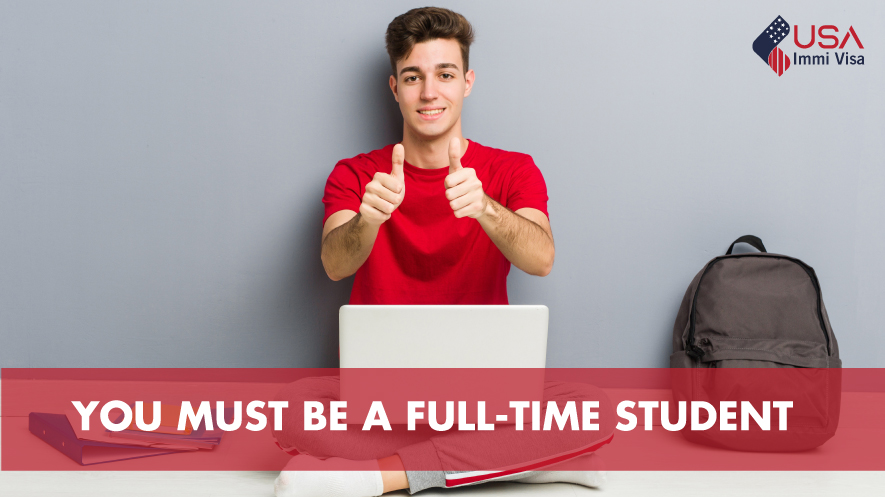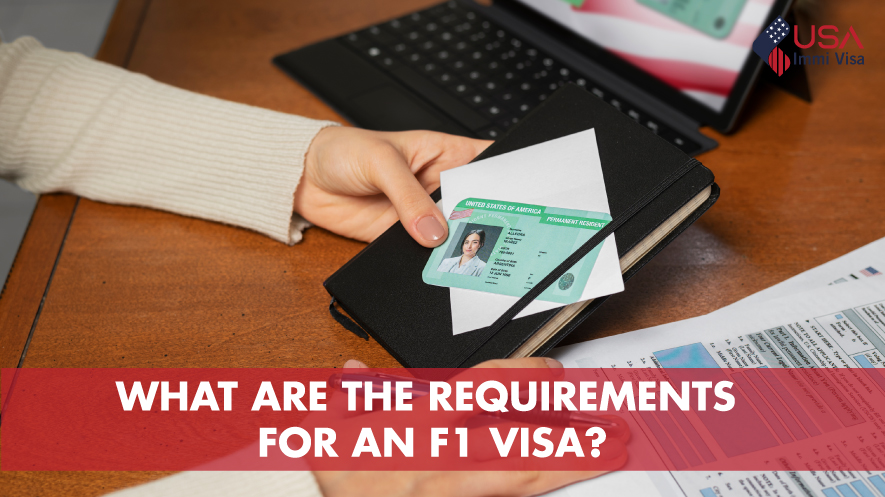Explore the opportunities of studying in the USA with an F1 Visa. Learn about the application process, interview tips, and requirements to kickstart your educational journey with confidence. Get expert advice and all the resources you need for a successful F1 Visa application
F1 visas are available to students traveling to the United States to attend a full course of study at an SEVIS-registered educational institution or to participate in a student exchange program. These include colleges, universities, conservatories, academic high schools, and language training institutions.
Applicants must meet several requirements, including strong ties to their home country and sufficient financial support. Failure to do so will result in a visa refusal.
You must be a full-time student
To qualify for an F1 visa, you must be accepted into a full course of study at a school that is registered with the Student and Exchange Visitor Program (SEVP). These schools aren’t just universities — SEVP-registered schools can also be seminaries, private elementary schools, conservatories, or language programs. In addition, the F1 visa requires you to show that you have sufficient financial resources to cover the cost of your education and living expenses while in the United States. You should consult the Study USA Financing Guide to prepare for this aspect of your time in the US.
You will need to submit numerous documents with your application, including academic transcripts and diplomas, test scores from the SAT, GRE, or TOEFL, bank statements, and proof of funds to pay for your studies. You will also need to provide proof of your intent to return home when your program is finished. If you are bringing a spouse and/or children with you, they will need to have their own derived F-2 visas and be able to demonstrate their financial stability as well.
Once you have the required documentation, you will need to attend a visa interview at your embassy or consulate. This interview will usually take around five minutes and is conducted in English. The questions you will be asked will vary but can include why you chose your specific program, your academic achievements, and your finances. You may also be asked about Curricular Practical Training (CPT) or other off-campus employment opportunities.
If you don’t meet these requirements, your visa will be denied. However, you can apply to appeal the decision. Premium applications can be submitted to the embassy or consulate via mail, allowing students to avoid an interview altogether.
It is important to maintain your F or M student status throughout your stay in the US. If you violate your status, it can lead to a ban from the country or even deportation. To avoid this, you must enroll as a full-time student. You can also apply for an extension of your status, but it is best to consult with a professional immigration attorney before you make any moves.

You must have strong ties to your home country
When a student applies for an F1 visa or any other kind of study visa, they must prove that they intend to return home after their studies. The US Embassy official may ask questions about your family, friends, and financial connections in your home country. It is important to answer these questions clearly and honestly. If you do not, you risk failing your interview and getting a 214(b) Rejection.
Strong ties are a combination of the various aspects that bind you to your country of residence, such as your job, property, and family. The consular officer will be looking at all of these aspects when deciding whether or not to grant you a visa.
Some examples of ties include a letter from your employer, bank statements, a marriage certificate, and civil status certificates. The embassy official will also look at the quality of your education and may question you about your plans for your future career in your country.
It is crucial to have a good plan for your future in your home country. This will help convince the embassy official that you really want to return home after your studies are complete. The official may also ask about the length of your stay in the United States.
Another way to prove a solid plan for your future is to have an investment in the country where you live. This can be a business or a real estate property. You can also take out loans to invest in your country.
The embassy will probably not accept personal loans or other forms of financial support as proof of your ties to your home country. However, they will accept scholarships and other forms of financial aid. The embassy will also look at your current employment and past work experience in your country of residence. They will want to see that you have worked for at least a year in your field of study before coming to the United States.
The embassy will also want to know that you are committed to volunteering in your country of residence. This will show that you have a passion for your country and are committed to giving back.
You must have sufficient financial support
Students with an F1 visa must show that they have sufficient financial support to cover their tuition and living expenses. This is usually done by showing proof of funds in their bank accounts, or by applying for scholarships. They must also have strong ties to their home country and intend to return after they complete their studies in the United States. Students from countries with poor economic conditions or civil unrest are often exempted from this requirement.
The F1 visa is a non-immigrant student visa that allows international students to attend a US university or college for academic, vocational, or language training purposes. This visa is a great option for students who wish to travel to the United States, as it gives them a flexible and affordable way to study in the country. It can be obtained by submitting a completed application to a SEVP-approved school, which includes high schools, public or private secondary or elementary schools, seminaries, conservatories, and language programs.
Generally, an F1 visa is valid for the duration of your course of study. In most cases, it is possible to change your status from an F1 to a different visa type (such as an H-1B) while you are in the United States. However, this can be a complicated process and requires the support of an immigration lawyer.
If you are a full-time student and have been admitted to a US college or university, you can apply for an F1 visa through the DS-160 online form. You must submit supporting documents such as a sponsorship letter, official transcripts, and proof of financial support. In addition, you must have a valid passport and pay the required fee.
While studying in the US, you can work part-time while classes are in session and full-time during breaks. However, you cannot apply for permanent residency while on an F1 visa. In order to apply for a Green Card, you must self-petition as a person of extraordinary ability or get married in the US to qualify.
Students on an F-1 visa are allowed to travel outside the US during their university breaks and in case of emergency. It is advisable to check the Department of Homeland Security’s website before traveling, as they may have special provisions in place for students from certain countries that are affected by natural disasters or civil unrest.
You must be in good health
An F-1 student visa is a nonimmigrant visa that allows international students to study in the United States. It is granted to students who can prove that they have enough money to cover tuition, room, board, and living expenses. Most schools require a hefty amount of savings before they will let a student enroll, and students can’t count on working in the U.S. to help pay their bills. While working on campus is permitted for some F-1 students, the hours are restricted to 20 a week and the work must be unpaid.
To be eligible for an F-1 visa, a student must meet all requirements set by the Department of Homeland Security and SEVIS. These include completing a full course of study at an SEVIS-registered institution or student exchange program and maintaining academic progress. Students are expected to attend their classes in person, and online courses are typically limited to one per term. Hybrid classes that combine a physical component with an online one are usually considered to be on-campus courses for visa status purposes.
Students are required to have a health insurance plan to be in good standing with their school and should keep in mind that their coverage may not be adequate for the duration of their stay in the US. They also need to be able to show proof of sufficient financial support to continue their studies if they want to renew their visa or change their status.
If a student is having trouble making academic progress, they should speak to their DSO about dropping below a full course load. In some cases, DSOs will authorize a reduced course load due to illness or other circumstances. It is important for students to communicate with their DSO before doing this, as reducing their course load can affect their immigration status.
Students should start the visa application process as early as possible to avoid delays. This is especially true during the summer when many applications are received at the same time. The earlier a student applies, the more likely their visa will be approved. Moreover, an early visa will allow students to make travel arrangements and find roommates before the busy season arrives.


